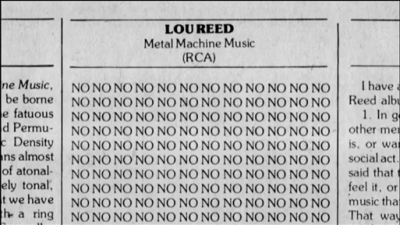In an era when music was expensive and hard to come by, people used to do research before buying an album or single. That means looking at the record review section of magazines such asRolling Stone,Spin,Mojo,Q, and. did.

Each had a staff of critics whose job was to break down the music and form an opinion on whether a particular release was worth your time and money. . Some of these magazines even collected and published the work of critics.
Commentary: There is a very big problem with music today. May not be so good
Music fans trust — relied on — Robert Christgau's book (Rolling Stone, Billboard, Village Voice , Playboy), Lisa Robinson (CREEM, NME, Rock Scene, Vanity Fair), Nick Kent (NME, The Face), David Fricke (Rolling Stone), Paul Morley (The NME, BLITZ), Greil Marcus (Village Voice, Rolling Stone) and, of course, Lester Bangs (CREEM, Rolling Stone), perhaps more than anyone else, who elevated rock criticism to a respected art form.
The story continues under the ad
They and others help fans connect more with music and tell us about how they make stars. , helped me understand things.
Old-fashioned record reviews were not only enlightening, they were also entertaining. For example, take this review of Lou Reed — er — hard-to-listen, released from record deal metal machine music. Published in CREEM in 1975.

And it wasn't just their opinion that we evaluated. . They contributed to culture. In 1971, Dave His Marsh first used the word "punk" to describe some kind of raw rock and roll in his article on CREEM. and Mysterian. The BBC's Stuart McConney is credited with popularizing the term 'Britpop'. Chrissie Hind applied lessons learned from her experience as a journalist atThe NME to form The Pretenders. Pet Shop Boys' Neil Tennant is his one of the first type online whose story continues under theSmash Hits
ad. It's one. Music sites included publishing reviews (or at least opinions) of new releases. Perhaps the most famous and infamous of these was Pitchfork, which proved to have no problem skewering submissions. The best/worst review in that post — a critique of Jet's Shine On album in 2006 — contained no words at allbut the message was very
A critic should be fearless in his opinion and not afraid to criticize as he sees it. Dave Marsh, for example, consistently criticized John Bonham for his skill as a drummer, even though he was hailed as one of the greatest drummers of all time. Lester Bangs disliked Black Sabbath and called the lyrics on his debut album "insane".
Trending Story
Jon Landau, a critic who later raved about Bruce's Springsteen and later became his manager wrote about Jimi Hendrix: Despite Jimi's musical prowess and the accuracy of the group as a whole, the poor quality of the songs and the absurdity of the lyrics often get in the way.
The story continues under the ad
and J.D. Constantine writes about his 1985 album by the band GTR. his one-word evaluation. "S.H.T." Ah.
Read more: 10 Categories of the Music Fan Spectrum: Where Do You Fit?
Today, however, things are different, mainly because of social media.Thomas Hobbs points out in The Telegraph: "Browsing his section of NME's website in 2022, he called every other artist a 'genius', almost every song a 'catharsis, and Avoid criticism.”
Why. The backlash from fans, especially those organized as hardcore evangelists and protectors of brands such as Beyoncé, Taylor Swift, Lady Gaga, BTS, and Harry Styles. He says one negative thing and Beyhive, Swifties, Little Monsters, A.R.M.Y. and Stylers try to destroy you in the comments section of his Twitter and online posts. These “stans” — obsessive, rabid, aspiring fans of certain celebrities — are not only wrong, they are stupid, thoughtless, tasteless, and tasteless.
I learned this firsthand when she made an ill-advised mention of Kim Kardashian on Twitter. Though he had a second thought and deleted the post 15 minutes later, the counterattack lasted him a week. Some of the things written and speculated were not just hurtful but vicious, like I was responsible for the mass murder of puppies. also seemed to have no effect. The uproar eventually subsided, but a lesson was learned. The story can get the rights to her master following under the ad. In it, I called Taylor "Tay-Tay." The reaction was fierce, with at least one asking for an apology, a retraction, and some degree of physical flogging for my sexist and humiliating treatment of The Great Woman.
Fans disagree. Attacking critics for saying things has become a bloody sport. This toxic fandom has even seen some critics receive death threats, so it's no wonder critics have become less critical. Who needs this kind of grief and abuse.
READ MORE: Another episode of "I know you're a music fan of a certain vintage..."
Another issue is access. Spokespeople and managers follow what is written about their clients like the NSA follows Al Qaeda. Saying something negative risks cutting you not only from the artists you criticize, but from other artists on the roster.Yes, they hold grudges and have long memories. Without access to music journalists, much of what they do for a living evaporates. How are journalists supposed to tell the truth if they acquiesce to pressure?
So what does this mean for the future of music journalism? I've noticed a workaround where critics post music recommendations they like instead of publishing critiques about releases. There will always be someone with the fortitude to stand up to the Stan mob out there.
Story Continues Under Advertisement
But I worry that an important form of serious criticism of art is waning. Acceptance of discouraging words about the object of their obsession.
—
Alan Cross is Q107 and he is a broadcaster for 102.1 the Edge and a commentator for Global News.
Apple Podcasts or Google Play
© for Alan's ongoing new music podcast Subscribe to history. 2022 Global News, a division of Corus Entertainment Inc.


